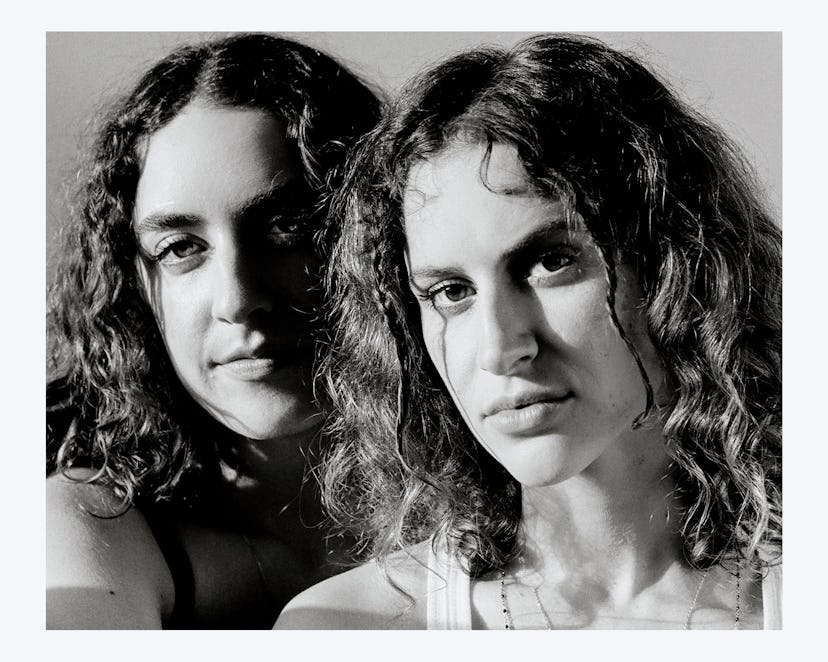In Tommy Lefroy’s Rivals EP, the indie duo Tessa Mouzourakis and Wynter Bethel wage war on societal expectations of women. The 6-track project, out March 10, arrives as winter melts into spring. Despite their latest work marking an advanced creative era, the band’s ever-playful lyricism and deliberations on adolescence remain at the core of Rivals. Also present: their needlepoint focus on wresting cultural presumptions of womanhood. “Even calling it ‘Rivals,’ we’re poking fun at the women-pitted-against-each-other trope,” Mouzourakis says in an interview with Bethel, both of whom speak to me from Montreal just a few hours before stepping on stage (they’re currently in the midst of a North American tour supporting Samia across 22 dates and over a dozen states).
Although they’ve grown in popularity, with streaming numbers in the millions, Tommy Lefroy hasn’t sacrificed the artful nature of their songwriting. Bethel and Mouzourakis are set on ensuring those who scream back their lyrics to them know they’re not alone. Relatability, between artists and audience, is particularly vital to Tommy Lefroy in the Sad Indie Girl music space. “Once anything is a trope, of course it’s a generalization and it’s unfair,” Bethel says before stating they nevertheless identify with the label. “Throughout society, the whispers of women have changed things,” she adds. “Women are talking about things and giving space for conversions that aren’t otherwise [acknowledged]. As much as it’s a funny trope, it’s also a secret weapon, especially for young people to engage in a culture that addresses mental health openly.” In that regard, Tommy Lefroy has forged a space in the indie music scene where womanhood, queerness, and frank discussions of sensitivity can be heard. As Mouzourakis puts it: “Creating this community that feels more bonded than any group of people who like a certain musician, we have something to talk about—and an understanding from the get-go.”
Tommy Lefroy’s 2021 EP, Flight Risk, created in the quietude of the pandemic, catapulted the duo onto TikTok For You pages with the breakout track “The Cause.” (“Flight Risk was us asking if we could, Rivals is knowing we can,” Bethel explains.) The new EP sees diaristic prose form an authentic coming-of-age reverie. Tommy Lefroy purges toxic expectations on the folk-like song “The Mess” (“I thought being a woman was cleaning up the mess / but I am, I am the mess”) and then ruminates on debilitating struggles with mental health on the upbeat “Worst Case Kid” (“dysphoria melts me when I get home”).
Rivals is abound with stomach-punching one-liners that precede cathartic choruses. “There was a lot more thinking about what lyrics we want to sing along with people—things we didn’t even think was possible when writing Flight Risk,” Bethel says of the new record. The project began in the summer of 2021, when the songwriter-producer pair were struggling with imposter syndrome as they transitioned from songwriting for others to being the face of their own music. Illustrating that precise dichotomy, the EP’s opener “Dog Eat Dog,” a guitar-driven anthemic ballad, begins with: “I’ve got what it takes / And I feel nothing at all.” Living the dream of touring their own music collided with reconciling “unworthiness and disconnect.” They note Rivals was therapeutic in this sense, a chance “to describe what feels sometimes indescribable.”
Northern Michigan-raised Bethel and Vancouver-repping Mouzourakis first connected over a shared love of boygenius (the indie trio featuring Julien Baker, Phoebe Bridgers, and Lucy Dacus). They bridged the Atlantic gulf between L.A. and London, which separated them during the pandemic, with youthful idyllicism and impeccable harmonies. They’re a united front, so much so that throughout our call they finish each other’s sentences and prompt one another’s anecdotes.
The pair is also bonded by their self-described status as “big literary nerds.” Mouzourakis and Bethel’s soundscape is packed full of references to historical, literary, and personal anecdotes. Even the band name is a literary nom de plume; Tommy Lefory is a nod to Jane Austen’s own real-life Mr. Darcy, Thomas Langlois Lefroy. Mouzourakis also says their process is akin to English lessons in school: “deconstructing each line and peeling back the layers. That’s something we try to do in the music, too.”
Like creative writing teachers, the pair is full of examples. On “Slick,” the line “learn how to rage before I die” refers to “The Aeneid” by Virgil. (“There’s a lot of imagery of armor and combativeness, this sense of a call to arms,” Mouzourakis explains.) Bethel furthers on “Worst Case Kid,” a reference to Dylan Thomas’s “Altarwise by Owl Light,” with the phrase “a killer with a jaw for news”—that was taken from a heated conversation with the individual who inspired the song. Self-referentiality arises, too, with inserted voice memos—the atmospheric rumble of a thunderstorm and a Parisian priest scolding whispering students—embedded from their lives into instrumentals. In these personal touches, Tommy Lefroy emerges from the chrysalis of self-conscious youth to tell the tales of adolescent womanhood: a journey of heartbreak and healing.
